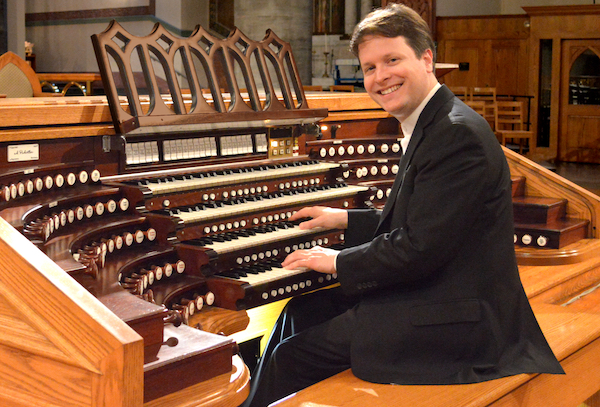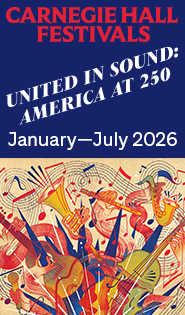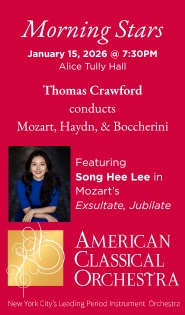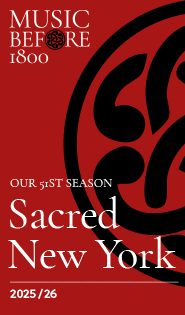Jacobs’ French organ series hits cruising speed

The second concert in organist Paul Jacobs’ “Great French Organ Tradition”—which took place Tuesday night at the Church of St. Mary the Virgin—set the previous week’s opening event in perspective as the cocktail that prepared the appetite for the main course.
The first concert, in Paul Hall at Juilliard, introduced the foundations of this national music, and explained what made it both explicitly French and unique. Tuesday night, as Jacobs played the organ in the gothic expanse of the church, one heard his concept, and this music, brought to fruition.
Jacobs chose the music well. All were from the 20th century, works that took the tools of instrumental color and improvisation and pushed them to a new level of virtuosic thinking and playing. And they were right for the space and the instrument, the church’s resonance cushioning the pleasingly rough, crunchy sound of the organ and boasting the expression of some liturgical and even mystical sensibilities.
Indeed the setting was one of the main points of the program. Speaking to the audience before he began playing, Jacob encouraged everyone to not turn in their seats and watch him in the organ loft at the back of the pews, saying he wanted all to have the full experience of the setting.
The two poles of the concert were the contemporaries Olivier Messiaen and Maurice Duruflé—the former the most distinctive organ composer of the past century, the latter likely the most technically accomplished. Jacobs finished with Duruflé’s marvelous Op. 5 Suite, but the centerpiece of the evening was Messiaen’s Messe de la Pentecôte.
The paradox of Messiaen is that pieces like this even work, much less have power. His mysticism was neither uncommon nor hermetic, but he translated it through his synesthesia—an experience that can’t truly be shared. The organ, with its reeds and flutes and brass and grinding contrabassoon bass (and the possible ecstatics of improvisation) seemed custom designed for him.
Jacobs played the Messe with a seamless sounding sympathy, gliding through the haunting, spooky passages of isolated timbres and bird calls floating above a cloud of harmonies, at other times playing with such terror and technical skill that the music sounded improvised on the spot. One was again impressed with Jacobs’ orchestral choices, which sounded right for the music, including the crystalline descending cadences that sounded like angels gliding down from the heavens (radically different than what one can here from Messiaen’s own organ at the Église de la Sainte-Trinité in Paris).
Surrounding the Messe was music from Messiaen’s colleague Jean Langlais: his “Acclamations Carolingiennes” from the Op. 56 Suite Médiévale, “Rosace” from Henri Mulet’s Esquisses Byzantine (composed during WWI), and Jean Guillou’s Saga No. 4, Op. 20.
Langlais’ piece was robust, declaratory, with Jacobs adding embellishments of freedom, while Guillou and Mulet, in this context, sounded more conventional. Mulet’s lovely “Rosace” came after the Messe and established a firm ground of phrasing and harmonic rhythm that Jacobs exploded with Guillou’s Saga. The composer, who died earlier this year at 88, was a long-time organist at the important church of Saint Eustache in Paris, and an avant-gardist. His Saga’s were his own transcriptions of improvisations he recorded on a very 1969 album called Visions cosmiques—Jacobs played this “cosmic” music with physicality.
Duruflé’s Suite was more formalized, drier only in the sense that it was secular and objective, with a stricter structure. Jacobs introduced this by describing first hearing it at 16, and how its impact helped turn him into the musician he is today.
As he warned, the opening Prelude was deeply mournful, nearly nihilistic in its darkness, but given meaning by the beauty of its order and Jacobs balanced, restrained playing. As the music went by, one was transfixed by a statue of the virgin in the distance, a sensation like watching the camera pan in to Breugel’s Hunters in the Snow as the soundtrack plays Bach’s Choral Prelude in F Minor in Andrei Tarkovsky’s Solaris.
After throwing himself into the improvisatory style of so much of the music beforehand, his thoughtful pace and even rhythms were settling and clarifying, even as the piece swung from the despairing depths of the Prelude to the manic joy of the coda in the Toccata finale.
Paul Jacobs concludes “The Great French Organ Tradition” 7:30 p.m. September 24, at the Church of St. Ignatius Loyola. ignatius.nyc




Posted Sep 18, 2019 at 7:28 pm by Edward D. Peterson
Mr. Jacobs is indeed a Great Artist, who fortunately for all listeners happens to play the Organ. How wonderful for the Organ, revealed as a very musical instrument of color with an amazing history behind it in his hands through his talent and hard work.